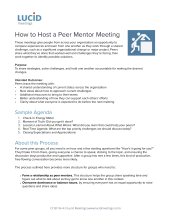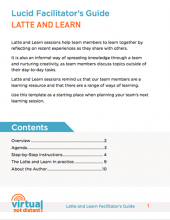You can find an introduction to Community of Practice Meetings in Chapter 32 of Where the Action Is. These resources will help you plan, run, and troubleshoot the specific Community of Practice Meetings your team needs.
Definition
A Community of Practice Meeting is used by people with a shared interest in a topic for networking, learning, and mutual support.
Questions Answered
- What can we teach each other that may help us improve our individual practice in this area?
- How can we advance this topic together?
Examples
- Monthly Safety Committee Meeting
- Project Manager’s Meetup
- Lunch-and-Learn (sometimes called a “Brown Bag,”“Town Hall,” or whatever your organization uses)
Purpose
- Topic-focused exchange of ideas.
- Organizational and individual capability development.
- Relationship development.
Work Outcomes
- Focused attention in an area that doesn’t warrant a dedicated team.
- Organizational capability development: more skilled people.
Human Outcomes
- New knowledge, skills, and attitudes.
- Improved ability to perform the job.
- Recognition.
- A feeling of belonging.
- Larger networks.
Meeting Agenda Templates and Guides
How to Host a Peer Mentor MeetingElise Keith - These meetings give people from across your organization an opportunity to compare experiences and learn from one another as they work through a shared challenge, such as a significant organizational change or major project. Peers share what they’ve done that worked well and challenges they’re facing, then work... [ more ] |
|
How to Run a Latte and Learn Reflection MeetingPilar Orti - This is a meeting agenda template for "Latte and Learn." Latte and Learn sessions help team members to learn together by reflecting on a recent experience as they share it with others. It is also an informal way of spreading knowledge through a team and nurturing creativity, as team members discuss topics outside... [ more ] |
Recommended Reading & Resources
Articles
- "Effective safety committees", Thomas J. Bukowski (2014).
Research Papers
- "Developmental sequence in small groups", Bruce Tuckman (1965).
Websites
Glossary of Meeting Terms
General Term
According to Job Embeddedness Theory, when an employee is more embedded within their organization, they are less likely to quit. Unlike simpler measures of job satisfaction or self-reports of engagement, job...
Technique
LEAN Coffee is one way to build an agenda on the fly. Groups using this structured meeting technique brainstorm then decide the topics to be discussed at the start of the meeting. This meeting technique works for...
PALPaR is a technique used by presenters to create an effective exchange in response to a proposal. The name of the technique is an acronym for:
Present
Ask
Listen
Pause
and
Reply
To...
The real-time agenda is a process for co-creating, prioritizing and discussing a list of topics in real time.
A real-time agenda isn’t a type of meeting. It’s a technique that you can use in many different types of...
Meeting Type
A walking meeting is exactly what it sounds like; a meeting conducted while walking. Proponents of walking meetings say walking meetings lead to more natural conversations and enhanced creativity. They cite research...

